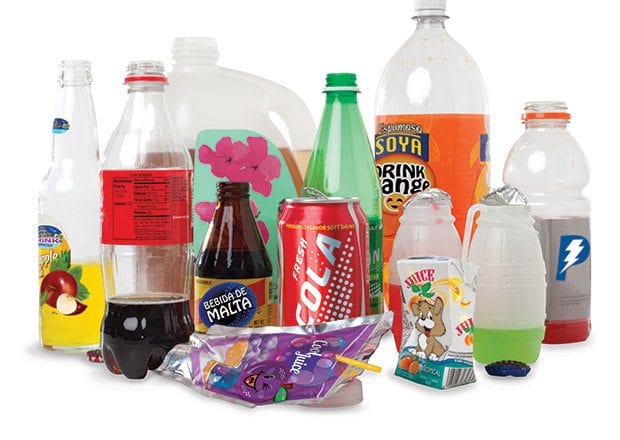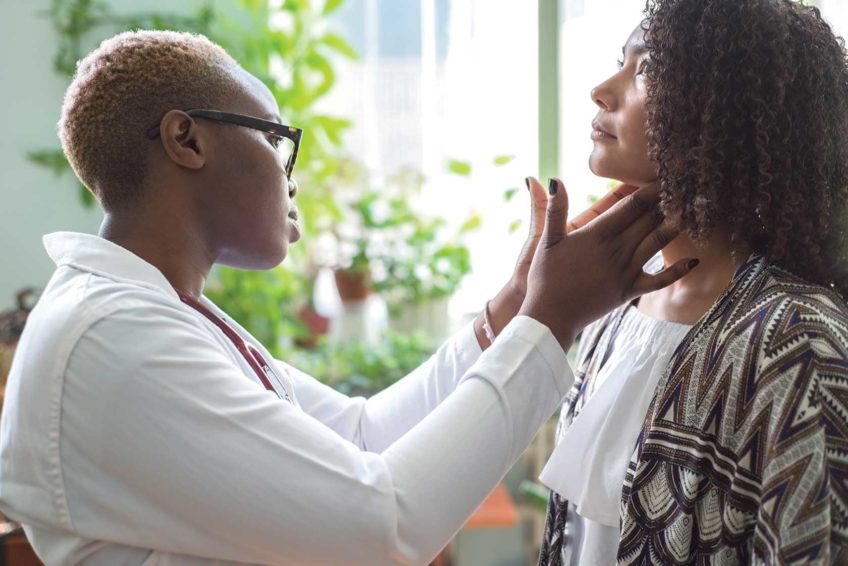Sugar-sweetened beverages
Twelve ounces a day increase the risk of diabetes


Like many women, Samara Gaul, a resident of Dorchester, had put on some extra weight after giving birth to her two children. She did her best to change her eating habits and to get more exercise, but she eventually learned that much of that extra weight was likely due not just to what she was eating, but also to what she was drinking. Sugar-sweetened beverages were the culprit.
That little bit of knowledge changed everything.
“When I learned that a can of fruit punch or soda a day can add five pounds of fat to your body each year, I was flabbergasted,” said Samara, an administrative assistant at the Boston Public Health Commission. Sugar-sweetened juice drinks and teas were a big part of Samara’s life, and all that sugar was adding up. Over a three-year period she had gained 45 pounds.
And the added weight was not the only cost she was paying for drinking sugary beverages. Samara found out that she was at a higher risk of developing diabetes.
All that added sugar was taking a toll.
A 2010 study by researchers at the Harvard School of Public Health underscored the harmful effects of sugar, not just in weight gain, but also in contributing to diabetes. The study found that people who consume sugary drinks regularly – 12 ounces or more per day – have a 26 percent greater risk of developing type 2 diabetes, when compared to people who rarely consume such drinks.
While consumption of too much added sugar from any type of food can contribute to obesity and diabetes, sugary drinks are the largest single source of sugar in Americans’ diets. This includes soda, sports drinks, sweetened tea, coffee and energy drinks. The American Heart Association estimates that 100,000 cases of diabetes over the past decade were caused by the consumption of sugar-sweetened beverages.
Drinking sugar-sweetened beverages delivers a one-two punch to your health. With no nutritional value, they’re full of ‘empty calories’ that lead to weight gain, which is itself a risk factor for diabetes. And the consumption of ‘liquid sugar’ without some fiber to slow down its digestion causes a quick rise in blood glucose (blood sugar). Our bodies produce a hormone called insulin that converts blood glucose into energy for our cells. But the repeated spikes in blood glucose caused by one or two sugary drinks a day can disrupt the body’s ability to produce insulin, leading to insulin intolerance and eventually diabetes. Your blood glucose peaks and valleys can also feel like an energy yo-yo, making you feel sluggish when your blood glucose declines.
According to recent surveys, 20 percent of adults in Boston report having one or more sugar-sweetened beverage a day, and the rates are higher for black (29 percent) and Latino (29 percent) residents compared to white (13 percent) residents.
While overall self-report of diabetes among adults in Boston was almost 9 percent in 2013, these rates were also higher for black (14 percent) and Latino (13 percent) residents compared to 5 percent for white residents.
Faced with such alarming rates and inequities, the Boston Public Health Commission has led a series of public awareness campaigns to educate Bostonians about how they can make changes. The “Rethink Your Drink” campaign uses the image of a traffic light to offer residents an easy way to think about healthy drink options. A separate campaign, “Sugar Smarts”, aims to educate parents about the negative health effects that sugar-sweetened beverages have on their children. And the “Love That Boston Water” campaign has publicized that tap water is a cheap, refreshing, healthy alternative to sugary drinks.
Such efforts are helping parents like Samara Gaul achieve important health goals for themselves and their children. By changing what she drank, maintaining a healthy diet and continuing her exercise, Samara eventually lost 60 pounds — more than erasing the 45 pounds she had gained over the years. In addition to the many health benefits of maintaining a healthy weight, she also significantly lowered her risk of developing diabetes.
What advice would she give others looking to accomplish what she did?
“I would show them how much actual sugar that they are ingesting that they probably don’t even know about,” she said. “When you look at it, nobody should be consuming 20 teaspoons of sugar in a day. it’s disgusting.”
She’d also tell them how good she feels. “I feel healthy and more energized, and I know this will make a difference for my children as well. We’ve also saved money, because sugary juice drinks are not a necessity as they were before. I know we will all live longer healthier lives because of this change.”


![Banner [Virtual] Art Gallery](https://baystatebanner.com/wp-content/uploads/2024/04/Cagen-Luse_Men-at-store-e1713991226112-150x150.jpg)



